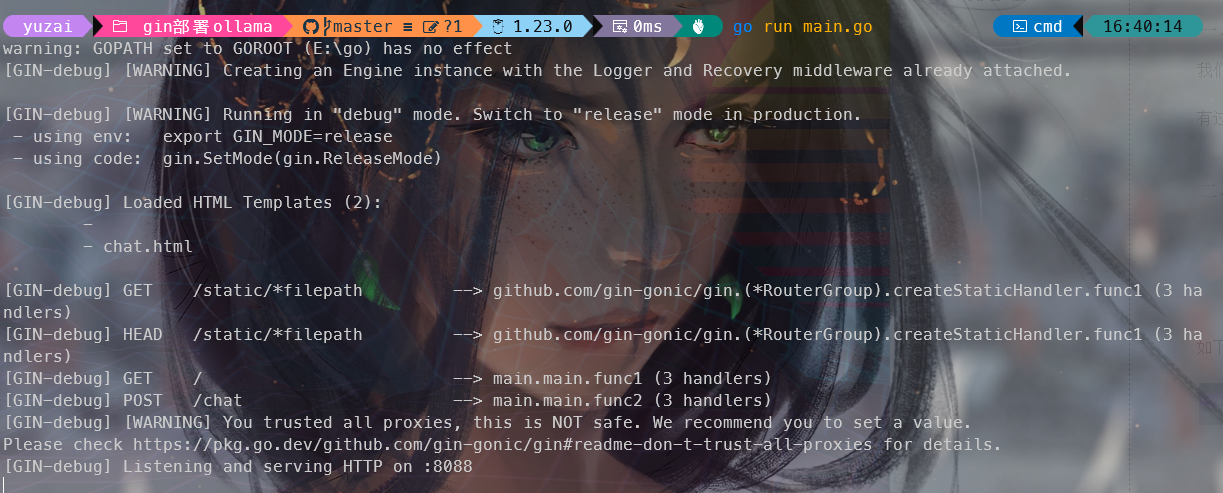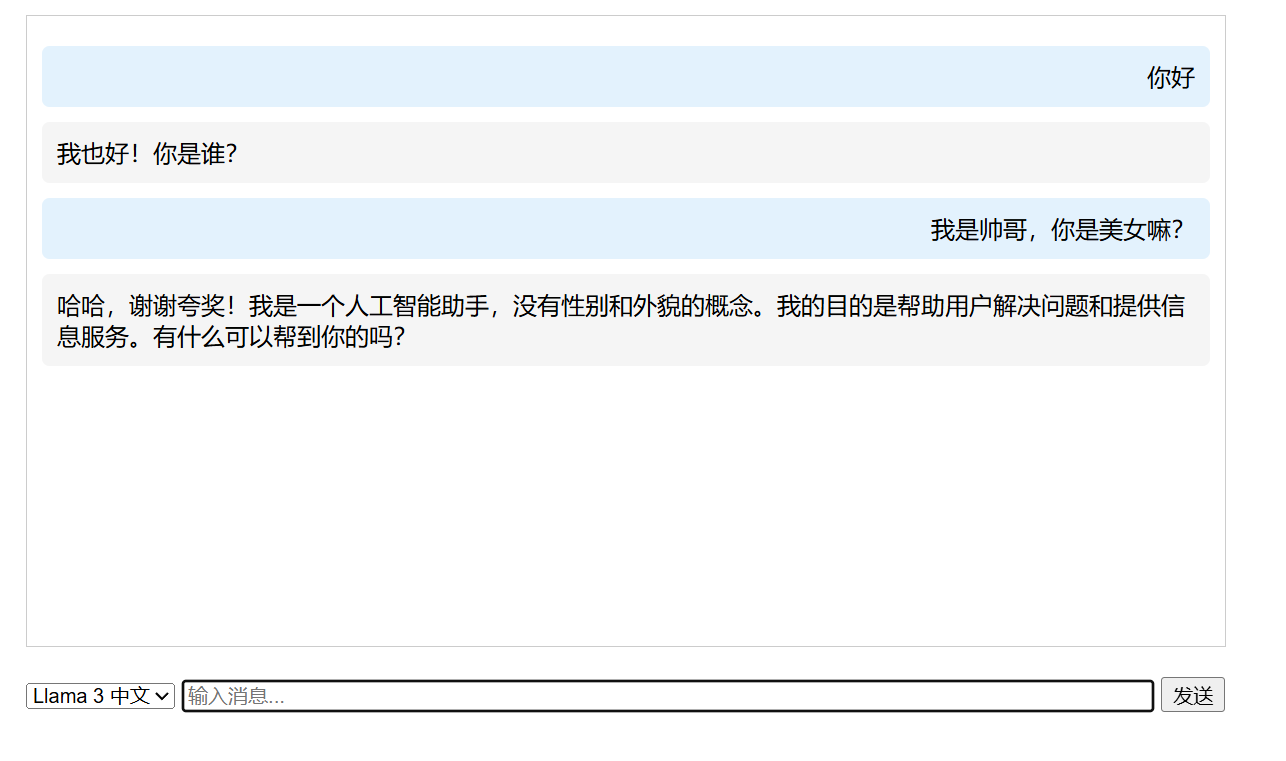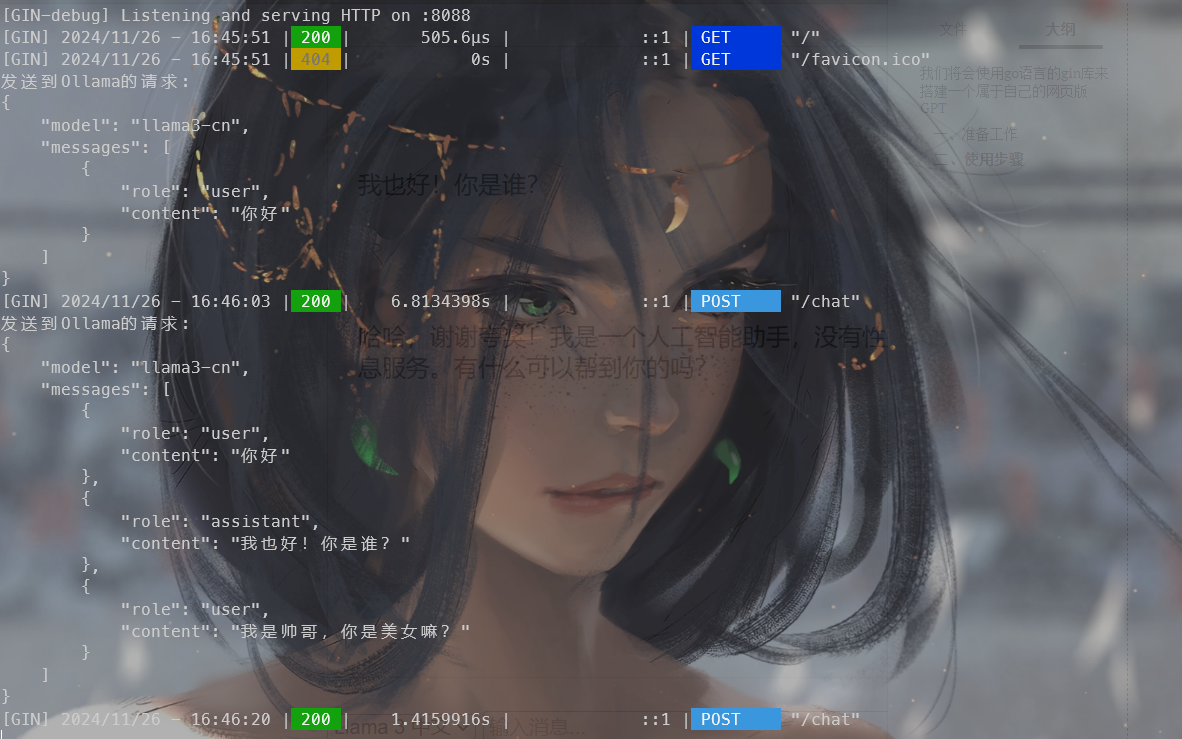我们将会使用go语言的gin库来搭建一个属于自己的网页版GPT
一、准备工作
我们需要使用到ollama,如何下载和使用[ollama](Ollama完整教程:本地LLM管理、WebUI对话、Python/Java客户端API应用 - 老牛啊 - 博客园)请看这个文档
有过gin环境的直接运行就可以,如果没有就根据文档内容去下载相关配置库
二、使用步骤
shell
git clone https://github.com/yty666zsy/gin_web_ai.git
cd gin_web_ai
ollama run "大模型的名称"这里需要注意的是要在chat.html文件中修改模型的名称,要不然找不到模型,在这个位置
然后运行代码,如下图所示

shell
"然后开启一个新的终端"
go run main.go这里需要注意的是端口号可以适当的进行修改,防止某些端口被占用的情况

然后本地访问127.0.0.1:8088就能打开网址进行愉快的聊天啦

同时后台同步打印信息以便日志管理

下面把代码贴出来
chat.html
html
<!DOCTYPE html>
<html>
<head>
<title>Ollama 聊天界面</title>
<style>
#chat-container {
width: 800px;
margin: 0 auto;
padding: 20px;
}
#messages {
height: 400px;
border: 1px solid #ccc;
overflow-y: auto;
margin-bottom: 20px;
padding: 10px;
}
.message {
margin: 10px 0;
padding: 10px;
border-radius: 5px;
}
.user {
background-color: #e3f2fd;
text-align: right;
}
.assistant {
background-color: #f5f5f5;
}
</style>
</head>
<body>
<div id="chat-container">
<div id="messages"></div>
<div>
<select id="model">
<option value="llama3-cn">Llama 3 中文</option>
</select>
<input type="text" id="message" style="width: 80%;" placeholder="输入消息...">
<button onclick="sendMessage()">发送</button>
</div>
</div>
<script>
const messagesDiv = document.getElementById('messages');
const messageInput = document.getElementById('message');
const modelSelect = document.getElementById('model');
let chatHistory = [];
function addMessage(role, content) {
const messageDiv = document.createElement('div');
messageDiv.className = `message ${role}`;
messageDiv.textContent = content;
messagesDiv.appendChild(messageDiv);
messagesDiv.scrollTop = messagesDiv.scrollHeight;
}
async function sendMessage() {
const content = messageInput.value.trim();
if (!content) return;
const requestData = {
model: modelSelect.value,
messages: chatHistory
};
console.log('发送请求:', requestData);
addMessage('user', content);
chatHistory.push({role: 'user', content: content});
messageInput.value = '';
try {
const response = await fetch('/chat', {
method: 'POST',
headers: {
'Content-Type': 'application/json',
},
body: JSON.stringify({
model: modelSelect.value,
messages: chatHistory
})
});
const data = await response.json();
chatHistory.push(data.message);
addMessage('assistant', data.message.content);
} catch (error) {
console.error('Error:', error);
addMessage('assistant', '发生错误,请重试。');
}
}
messageInput.addEventListener('keypress', function(e) {
if (e.key === 'Enter') {
sendMessage();
}
});
</script>
</body>
</html> main.go
go
package main
import (
"bytes"
"encoding/json"
"fmt"
//"io/ioutil"
"bufio"
"net"
"net/http"
"os"
"github.com/gin-gonic/gin"
)
type ChatRequest struct {
Model string `json:"model"`
Messages []Message `json:"messages"`
}
type Message struct {
Role string `json:"role"`
Content string `json:"content"`
}
type ChatResponse struct {
Message Message `json:"message"`
}
// 添加新的结构体用于处理流式响应
type StreamResponse struct {
Model string `json:"model"`
CreatedAt string `json:"created_at"`
Message Message `json:"message"`
Done bool `json:"done"`
DoneReason string `json:"done_reason,omitempty"`
}
// 在main函数前添加一个新的函数
func findAvailablePort(startPort int) int {
for port := startPort; port < startPort+100; port++ {
listener, err := net.Listen("tcp", fmt.Sprintf(":%d", port))
if err == nil {
listener.Close()
return port
}
}
return startPort // 如果没找到可用端口,返回初始端口
}
func main() {
r := gin.Default()
// 加载模板
r.LoadHTMLGlob("templates/*")
// 设置静态文件路径
r.Static("/static", "./static")
// 首页路由
r.GET("/", func(c *gin.Context) {
c.HTML(http.StatusOK, "chat.html", nil)
})
// 处理聊天请求的API
r.POST("/chat", func(c *gin.Context) {
var req ChatRequest
if err := c.BindJSON(&req); err != nil {
c.JSON(http.StatusBadRequest, gin.H{"error": err.Error()})
return
}
prettyJSON, _ := json.MarshalIndent(req, "", " ")
fmt.Printf("发送到Ollama的请求:\n%s\n", string(prettyJSON))
jsonData, _ := json.Marshal(req)
resp, err := http.Post("http://localhost:11434/api/chat", "application/json", bytes.NewBuffer(jsonData))
if err != nil {
fmt.Printf("调用Ollama API错误: %v\n", err)
c.JSON(http.StatusInternalServerError, gin.H{"error": err.Error()})
return
}
defer resp.Body.Close()
// 使用scanner来读取流式响应
scanner := bufio.NewScanner(resp.Body)
var fullContent string
for scanner.Scan() {
line := scanner.Text()
var streamResp StreamResponse
if err := json.Unmarshal([]byte(line), &streamResp); err != nil {
fmt.Printf("解析流式响应行错误: %v\n", err)
continue
}
// 累积内容
fullContent += streamResp.Message.Content
// 如果是最后一条消息
if streamResp.Done {
response := ChatResponse{
Message: Message{
Role: "assistant",
Content: fullContent,
},
}
c.JSON(http.StatusOK, response)
return
}
}
if err := scanner.Err(); err != nil {
fmt.Printf("读取流式响应错误: %v\n", err)
c.JSON(http.StatusInternalServerError, gin.H{"error": err.Error()})
return
}
})
// 从环境变量获取端口,如果未设置则使用默认值
port := os.Getenv("PORT")
if port == "" {
port = "8088"
}
r.Run(":" + port)
}